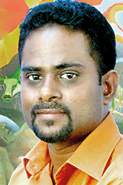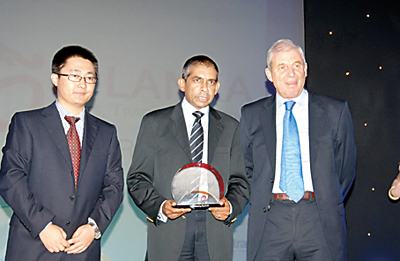Talking crocs
They have been around since the time of the dinosaurs – and even though the dinosaurs have been extinct for millions of years, this “ancient group” are still around, though under pressure more and more, due to their encounters with humans.
It is in the light of frequent human-crocodile conflicts not only in this country but across the world that a major gathering of ‘croc men and women’ in Sri Lanka next year becomes important not only for the survival of this apex predator and keystone species but also for humankind itself.
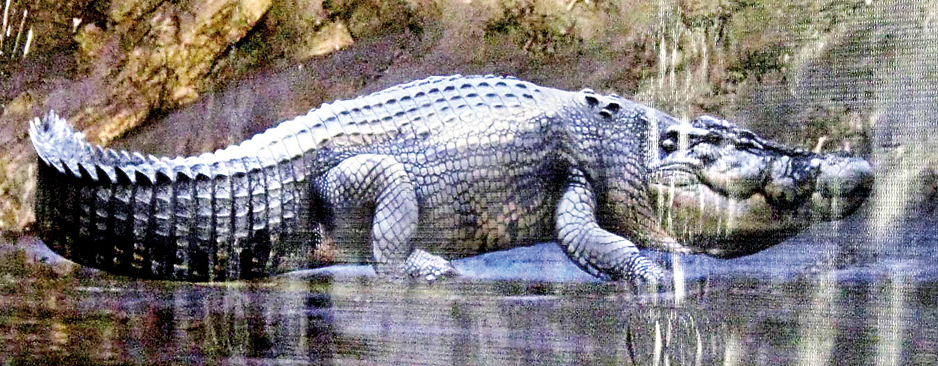
Lolong – the largest 21.3ft live Saltwater crocodile in captivity after it attacked and killed a girl in the Philippines. The croc is regarded as a national treasure there.
‘The World Crocodile Conference’ to be held in Sri Lanka from May 20-23, 2013 with the slogan ‘Living with crocodilians’ will also be a first for the country, with the man behind the effort being Sri Lanka’s ‘croc man’ Anslem de Silva.
“It is the first time that the biggest crocodile conference in the world will be held in Sri Lanka,” explained Mr. de Silva whose tireless efforts to make the bid for it in Manila, Philippines in May have paid off, adding that the 22nd Working Meeting of the Crocodile Specialist Group (CSG) of the International Union for Conservation of Nature (IUCN)/Species Survival Commission (SSC) will be held at the BMICH. He had been supported in his bid by Lanka Exhibition and Conference Services (LECS) and Sri Lanka Convention Bureau.
The Manila meeting also saw Mr. de Silva being nominated as CSG’s Regional Chairman of South Asia and Iran. The CSG is a worldwide network of biologists, wildlife managers, government officials, independent researchers, non-governmental organisation representatives, farmers, traders, tanners, fashion leaders and private companies actively involved in the conservation of the world’s 23 living species of alligators, crocodiles, caimans and gharials in the wild.
Back in Sri Lanka, Mr. de Silva along with the other members of the CSG, Regional Vice Chairman for Sri Lanka, Ruchira Somaweera, Jayantha Jayewardena, Manori Gunawardena, Ananda Nanayakkara, Charles Santiapillai, S. Wijeyamohan, Sameera Suranjan Karunarathna, Riyas Ahamed, Thasun Amarasinghe, Mendis Wickramasinghe and young researchers heavily involved in conservation and awareness-creation Adrian Gabrial, Dinal Samarasinghe, Majintha Madawala, Avinda Godahewa and Avishka Godahewa, have not been idle.
With crocodile experts from Australia, America, England, Germany, Africa, Iran, India, Pakistan, Bangladesh, Nepal, Malaysia, Thailand, China, Japan, Philippines, Hungary, Canada and many more expected to take part at this world forum, Mr. de Silva pointed out that local veterinarians, wildlife managers, conservationists and research workers should enter this important event onto their calendar as a “must-attend”.
Picking out some of the highlights, Mr. de Silva told the Sunday Times that IUCN/SSC Crocodile Specialist Group’s Chairman Prof. Graham Webb, Executive Officer Tom Dacey and other senior officials will convene the sessions during which country reports by regional chairmen will be presented.
Mr. de Silva has also held extensive discussions with CSG Red List Authority Dr. James Perran Ross of the Department of Wildlife Ecology and Conservation, University of Florida, America, about organizing an IUCN Red List Assessment for the three crocodile species (see graphic) in this region — Crocodylus palustris (Mugger), Crocodylus porosus (Saltwater crocodile) and Gavialis gangeticus (Gharial) — which will not only be important for Sri Lanka and the region but also for the World Red List. Sri Lanka has the Mugger and the Salty.
The first day of the Scientific Sessions will be devoted to South Asia, with Mr. de Silva and his team having already garnered “a big response” from India, Pakistan, Nepal and Bangladesh, it is understood.
“The world-famous Madras Crocodile Bank of India too will play a big role,” said Mr. de Silva, explaining that its Director and Chief Veterinarian are expected in Sri Lanka for in-depth talks shortly.
Referring to the numerous symposia that will be held, he said that during the one on the ‘Human-Crocodile Conflict’, world experts will present papers and discuss this critical issue, suggesting ways and means of not only protecting humans from attack but also crocodiles, as after each attack on humans many crocodiles are killed, posing a major danger to this ancient group of reptiles.
Another symposium will be on the Gavialis gangeticus (Indian gharial), found in the Indian subcontinent, mainly in the rivers of northern India and eastern Pakistan, he said, adding that “we have a good live specimen exhibited at the Dehiwela Zoological Gardens”.
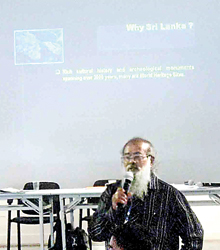
Mr. Anslem de Silva bidding for the next World Crocodile Conference in Manila (May 2012)
Other interesting facets of the conference will be a presentation of archaeological evidence with regard to crocodiles and crocodile artefacts by famous zoo-archaeologist Kelum Manamendra-Arachchi; an exhibition of crocodile paintings by one of the foremost animal artists of the country, Jayantha Jinasena; an exhibition of crocodiles by leading photographers; and the launch of several large volumes on crocodiles.
It will not be just meetings and talk about crocodiles, the Sunday Times learns, but delegates will show their commitment to research on this much-maligned creature by bringing in one or two items to go under the gavel. During the banquet on the last day, these items will be auctioned, says Mr. de Silva, adding that all the proceeds will go to research.
Big names in the government and private sectors such as the Department of Wildlife Conservation, the National Zoological Gardens (Mr. de Silva has been informed that officials of these institutions are working on research papers to be presented at the meeting), the Sri Lanka Tourism Promotion Bureau, the Sri Lanka Convention Bureau, Hayleys, Hatton National Bank and Odel (with an eye-catching satchel) have already indicated their interest in supporting this important conference, it is understood.
At this conference, the sting is certainly not in the tail but only benefits, according to Mr. de Silva, for after its conclusion all profits will be channelled by the Regional CSG to give a helping hand to young researchers.
All these efforts will be for the voiceless crocodiles6, he stressed, “for it is our duty to protect them”.
Conference open to all
The World Crocodile Conference is open to all. Anyone may attend the conference after registration. For more details please contact the Conference Secretariat in Colombo, Lanka Exhibition & Conference Services (Pvt) Ltd., by emailing mariesz@saexhibitions.com or the Conference Director: Anslem de Silva at kalds@sltnet.lk
Information on the world forum may be accessed at: www.csgsrilanka.com
Meanwhile, Mr. de Silva has invited both amateur artists and professional photographers to offer their paintings, sketches and photographs of crocodiles in their habitats for display during the conference.
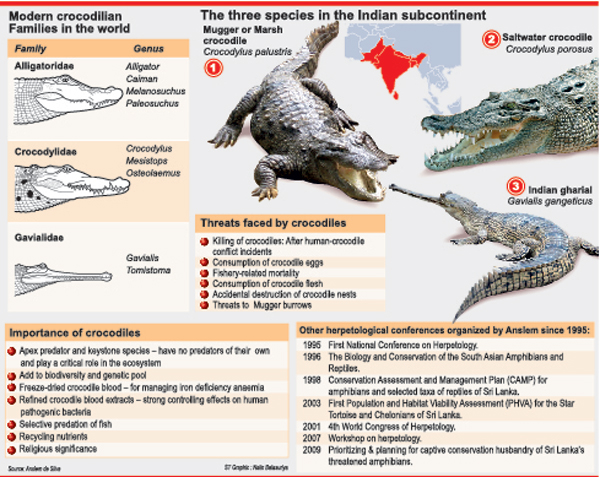 |
comments powered by Disqus

























